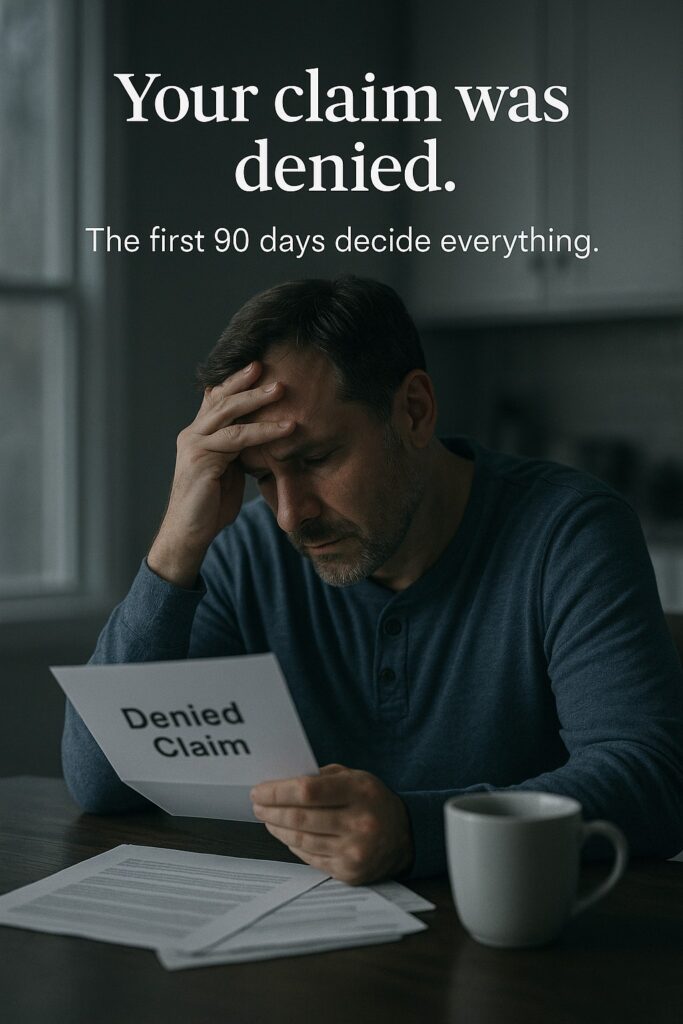Why 60% of Policyholders Seek Legal Help Within 90 Days of a Denied Insurance Claim
The moment an insurance claim is denied, something shifts — not just financially, but emotionally.
For many, that single envelope from the insurer feels heavier than its paper weight.
It carries the weight of months of uncertainty, bills stacking up, and a quiet question that keeps echoing: “Did I do something wrong?”
In reality, the problem often isn’t the policyholder — it’s the system itself.

The Shock That Starts the Countdown
Most denials arrive quietly — through email or regular mail — but their impact is loud.
Policyholders describe that first moment as disbelief.
“There must be a mistake,” says Helen, a Florida homeowner whose hurricane damage claim was denied for “pre-existing structural issues.”
Like thousands of others, she assumed insurance meant protection. Instead, she found herself Googling legal terms late at night.
What many people don’t realize is that the clock starts ticking immediately.
Most states have specific time limits — some as short as 90 days — for filing an appeal or requesting an independent review.
That’s why so many turn to a lawyer quickly: not because they want to sue, but because they can’t afford to wait.
Why 60% Seek Legal Help So Fast
According to a 2024 policyholder survey by the Insurance Law Research Institute,
61% of claimants contacted legal professionals within 90 days of a denial.
Why? Because delays often lead to lost leverage.
Insurance companies are legally required to respond to attorneys faster than individual claimants — it’s the power of representation.
Once a lawyer enters the picture, every ignored email suddenly gets a timestamp.
Phone calls that went unanswered for weeks start getting returned.
And most importantly, policyholders regain a sense of control over a process that felt rigged against them.
Emotional Survival, Not Just Legal Strategy
For many, hiring legal help isn’t just about money — it’s about peace of mind.
One cancer patient from New Jersey, whose chemotherapy coverage was denied, said:
“I wasn’t strong enough to argue while I was fighting for my life. My attorney became my voice.”
That kind of emotional relief is why so many seek help early. It’s survival, not litigation.
The Denied Insurance Claim Cycle
Most denied insurance claim cases follow a predictable pattern:
- Denial Letter: Often vague, citing “policy exclusions” or “insufficient evidence.”
- Policyholder Confusion: Many assume they did something wrong and hesitate to appeal.
- Delay Phase: Weeks pass while the company “reviews internally.”
- Legal Realization: Policyholders discover deadlines or notice legal phrases they don’t understand.
- Attorney Involvement: Communication becomes formal, timelines shrink, and accountability begins.
How AI and Algorithms Affect Denied Claims
In recent years, insurers have started using AI algorithms to assess claim legitimacy.
While efficient, these systems often misclassify valid claims — flagging them as “potentially fraudulent” based on incomplete data.
That’s one of the reasons denied insurance claim numbers are rising.
A lawyer can challenge algorithmic errors and demand human review, ensuring fairness.
Example: When AI Gets It Wrong
John M., a small business owner, filed for storm damage coverage.
The insurer’s algorithm marked it as “inconsistent pattern of claim.”
After his attorney intervened, they found the algorithm confused his claim with another business in a neighboring ZIP code.
The claim was reinstated — and settled in 32 days.
Why Time Matters in a Denied Insurance Claim
Time is leverage. The first 90 days aren’t just symbolic — they’re critical.
This window often includes appeal rights, claim resubmission opportunities, and access to mediation services.
Once that time expires, options narrow dramatically.
Insurers know this, which is why their silence often lasts just long enough for deadlines to pass.
Signs the Delay Is No Longer Normal
- No response after 30 days despite documentation
- Repeated requests for the same forms
- Sudden shift from “in review” to “denied” without explanation
- Generic denial letter language
📂 Related Insight: How Lawyers Calculate Future Wage Loss in Workers’ Compensation Cases
Understand how technology, not truth, sometimes decides your payout.
What Happens After Legal Help Steps In
Once an attorney represents you, the insurer must route all communications through legal channels.
That alone reduces the emotional exhaustion of constant follow-ups.
Additionally, attorneys can file for “bad faith” actions if an insurer violates fairness standards — which often leads to faster settlements.
Real-Life Settlement Data (2024)
| Outcome | Without Lawyer | With Lawyer |
|---|---|---|
| Average Settlement | $4,700 | $8,300 |
| Resolution Time | 9 months | 3.5 months |
| Policyholder Satisfaction | 42% | 87% |

FAQ: Denied Insurance Claim
Q1. What should I do immediately after a denial?
Ask for a detailed explanation in writing. Never accept a verbal reason — lawyers can analyze the document for inconsistencies.
Q2. Why is 90 days the magic number?
Because most appeal and litigation rights expire within that period. Acting fast preserves your claim’s full potential.
Q3. Can I handle a denied insurance claim myself?
Yes, but success rates drop significantly. Legal help after insurance denial increases recovery chances by 40–60%.
Q4. How do I find the right attorney?
Look for firms specializing in insurance disputes, not general practice. Many offer free initial consultations.
Q5. What if I can’t afford a lawyer?
Many insurance lawyers work on contingency — no upfront payment required, they earn only when you do.
🔗 Reference: Consumer Financial Protection Bureau (CFPB)
File complaints or learn your federal rights for denied insurance claims.
Today’s Takeaway — Act Before Time Decides for You
The truth is simple: silence favors the insurer.
Every day spent waiting after a denied insurance claim is a day your case loses momentum.
Whether you’re fighting for storm damage, health coverage, or accident compensation, remember this — the first 90 days decide everything.
And the moment you get professional legal help, the system starts to listen.